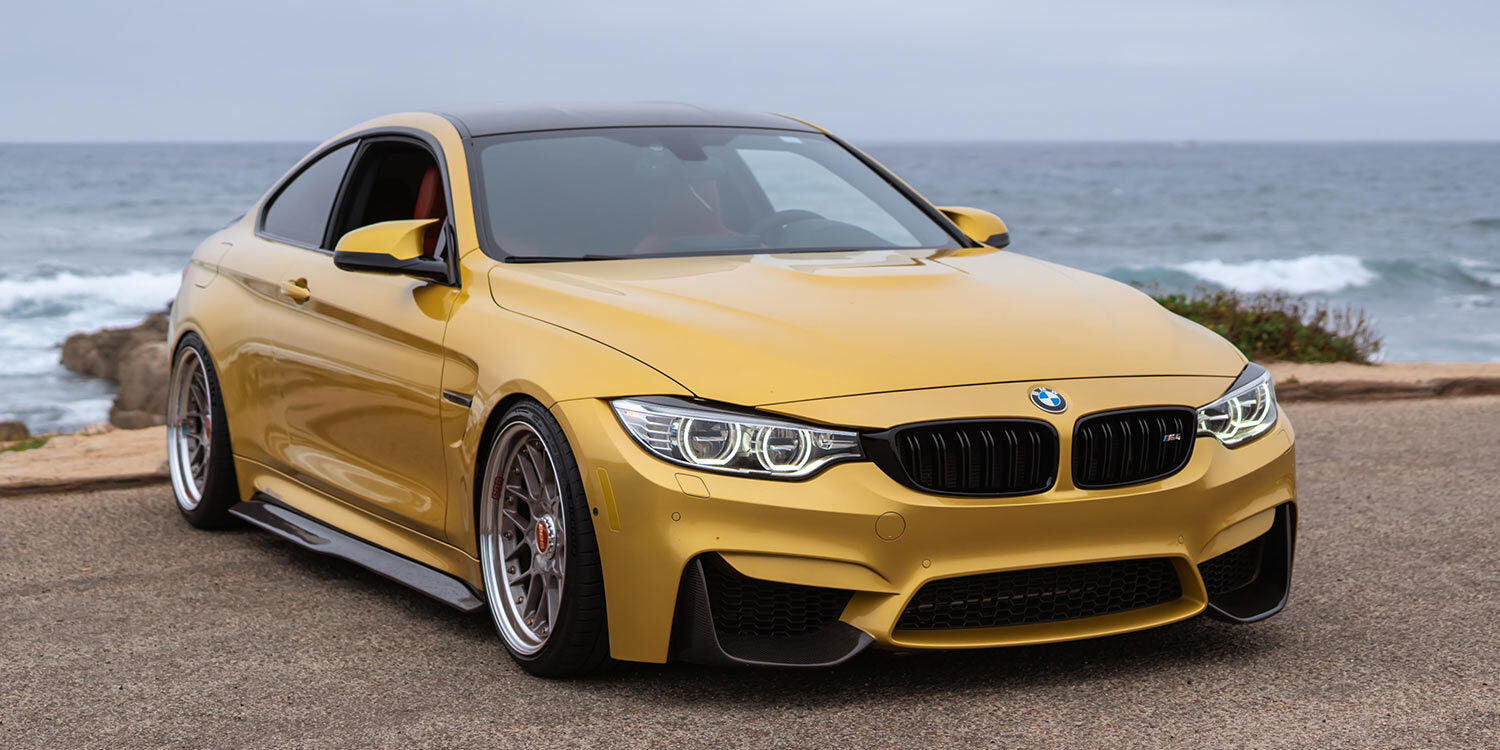
How to Enhance Your BMW with Carbon Fiber: A Complete Guide
When it comes to automotive design, every detail matters. From the sleek lines of the body to the cutting-edge technology under the hood, each element contributes to the overall experience of owning and driving a car. One crucial aspect that often sets vehicles apart is the choice of materials used in their construction.
In recent years, one material has become prominent for its exceptional properties and undeniable allure: carbon fiber. Carbon fiber has revolutionized the automotive industry and has become the material of choice for discerning car enthusiasts and manufacturers with its remarkable strength, lightweight nature, and undeniable visual appeal.
This blog will delve deep into why carbon fiber is the ideal choice for your Bimmer. We will explore the benefits it brings, from enhanced performance and handling to its aesthetic appeal and durability.
What Is Carbon Fiber?

Carbon fiber is a material that is made by combining carbon fibers with resin. The carbon fibers are long, thin strands that are very strong and lightweight. The resin is a material that holds the carbon fibers together.
Carbon fiber is made by a process called carbonization. In this process, the carbon fibers are heated to a very high temperature, which causes the organic material in the fibers to break down and form carbon. The carbon fibers are then combined with a resin and cured under heat and pressure.
Carbon Fiber Vs. Traditional Materials
Carbon fiber is a material that is made by combining carbon fibers with resin. The carbon fibers are long, thin strands that are very strong and lightweight. The resin is a material that holds the carbon fibers together.
Carbon fiber is often used in place of traditional materials, such as steel and aluminum because it is stronger, lighter, and more durable. Carbon fiber is also more resistant to corrosion and fatigue than traditional materials.
Here is a table comparing the properties of carbon fiber to some traditional materials:
|
Property |
Carbon Fiber |
Steel |
Aluminum |
|
Strength |
Very strong |
Strong |
Strong |
|
Weight |
Very lightweight |
Heavy |
Lightweight |
|
Durability |
Very durable |
Durable |
Durable |
|
Corrosion resistance |
Very resistant |
Resistant |
Not resistant |
|
Fatigue resistance |
Very resistant |
Not resistant |
Not resistant |
How Long Does Carbon Fiber Last On a Car?
The lifespan of carbon fiber components on a car can vary depending on several factors, making it difficult to provide an exact number of years. However, with proper care, Carbon fiber can last between 15 and 50 years, depending on the quality of the material and how well it is cared for.
Here are some factors that can affect the lifespan of carbon fiber parts:
- The quality of the carbon fiber: High-quality carbon fiber will last longer than low-quality carbon fiber.
- The manufacturing process: How the carbon fiber is manufactured can affect its lifespan.
- The environment: Carbon fiber parts exposed to harsh environments, such as UV radiation and extreme temperatures, will not last as long as those not exposed to these environments.
- The maintenance: Carbon fiber parts that are not properly maintained will not last as long as regularly cleaned and waxed parts.
How Do You Maintain Carbon Fiber?

- Proper Cleaning: Regularly clean carbon fiber parts using a mild soap or specialized carbon fiber cleaner. Avoid abrasive materials or harsh chemicals that can damage the surface. Gently wipe the parts clean and dry them thoroughly to prevent moisture-related issues.
- Protective Coatings: Apply a protective coating specifically designed for carbon fiber to provide additional protection against UV radiation, chemicals, and environmental elements. This helps prevent fading, discoloration, and potential damage.
- Avoid Excessive Stress: Be mindful of driving conditions and avoid situations that subject carbon fiber parts to excessive stress or impact. Avoid high curbs, speed bumps, and rough roads whenever possible to minimize the risk of damage.
- Temperature Considerations: Extreme heat or cold can affect carbon fiber. Avoid prolonged exposure to extreme temperatures and consider parking the car in shaded or temperature-controlled areas when possible.
- Regular Inspections: Periodically inspect carbon fiber parts for any signs of damage, cracks, or wear. Promptly address any issues to prevent further damage or potential failure.
- Avoid Chemical Exposure: Limit exposure to harsh chemicals, solvents, or petroleum-based products that can degrade or weaken carbon fiber. If cleaning agents are necessary, ensure they are safe for use on carbon fiber and follow the manufacturer's recommendations.
- Proper Installation: Ensure that carbon fiber parts are installed correctly by following manufacturer instructions or consulting with professionals who have experience with carbon fiber components. Improper installation can lead to premature wear or damage.
- Storage and Transportation: When storing or transporting spare carbon fiber parts, protect them from impacts, extreme temperatures, and excessive moisture. Use appropriate packaging or protective covers to prevent any potential damage.
Tips For Choosing And Installing Carbon Fiber Parts For Your BMW
Quality and Material Selection:
Opt for high-quality carbon fiber parts from reputable manufacturers or suppliers. Look for parts made from woven carbon fiber, which offers exceptional strength and durability. Check the finish and surface quality of the parts. Smooth finishes and precise fitment indicate attention to detail and superior craftsmanship.
Professional Installation:
Unless you have experience with carbon fiber installations, it is advisable to have the parts installed by a professional. They have the expertise and specialized tools to ensure proper fitment and alignment.
Professional installers can also provide valuable insights and recommendations based on their experience working with carbon fiber parts.
Maintenance and Care:
Follow the manufacturer's guidelines for cleaning and maintenance. Use a mild soap and water solution to clean the parts regularly, avoiding harsh chemicals that can damage the carbon fiber. Apply a protective coating or wax designed for the carbon fiber to preserve its finish, protect against UV radiation, and prevent fading or discoloration.

Fit and Finish:
Ensure that the carbon fiber parts fit correctly and seamlessly with your Bimmer. Poorly fitting parts may affect the overall aesthetics and functionality of the vehicle. Check for smooth edges and consistent weave patterns, as these are indications of quality craftsmanship.
Warranty and Support:
Consider the warranty offered by the manufacturer or supplier. A reliable warranty demonstrates confidence in the quality and longevity of the carbon fiber parts. Inquire about customer support options, such as assistance with installation or addressing any concerns or issues that may arise.
Research and Reviews:
Conduct thorough research on companies offering carbon fiber parts for BMW vehicles.
Read customer reviews and testimonials to gauge the overall satisfaction and experiences of others who have purchased and installed carbon fiber parts.
By following these tips, you can confidently select and install carbon fiber parts for your BMW, enhancing its appearance, performance, and driving experience. Remember to prioritize quality, seek professional help, and properly maintain the carbon fiber parts for long-lasting enjoyment.
Is Carbon Fiber Worth It On Cars?
Whether or not carbon fiber is worth it on cars depends on your individual needs and preferences. The lightweight nature of carbon fiber reduces the vehicle's weight, leading to improved fuel efficiency, handling, and performance. Carbon fiber's exceptional strength and rigidity also contribute to enhanced stability and structural integrity. While carbon fiber parts may come at a higher price point, the advantages they offer in terms of performance, aesthetics, and longevity can make them well worth the investment for car enthusiasts seeking the best in lightweight construction and distinctive styling.

How To Get Carbon Fiber On A BMW?
We've covered how to make sure your BMW is always up-to-date, and when it comes to enhancing its performance and style with carbon fiber, Bimmer Plug is your trusted partner.
Whether you're seeking to enhance your BMW's aerodynamics, add a touch of sportiness to its exterior, or elevate its interior with carbon fiber accents, Bimmer Plug has the perfect solution for you.
Trust in Bimmer Plug to deliver excellence, innovation, and the ultimate driving experience.


